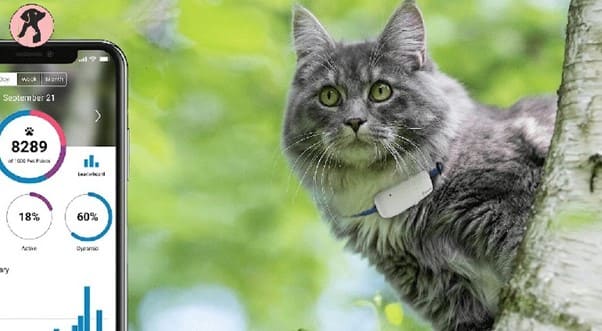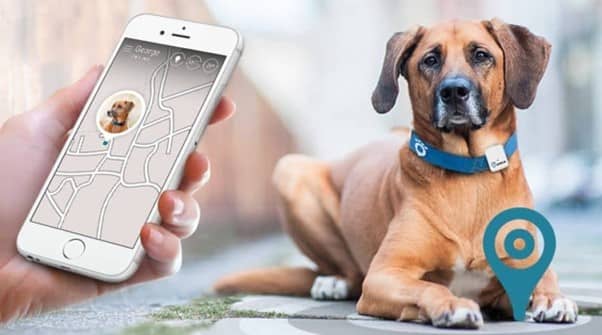Technology is not only in our smartphone, even our furry friends use it. More precisely, their owners can facilitate care processes and track location. Modern pet-tracking devices range from sophisticated GPS trackers to humble RFID tags. Is it convenient? Of course, but with this comes new concerns. The potential convenience is offset by the potential privacy concerns.

Overview of Pet-Tracking Devices
Experts have recorded the growth of pet-centric gadgets to 13.1 billion in 2022. This includes an extensive array of devices like GPS trackers, interactive cameras, and whimsical toys that can dispense treats remotely – even automated feeding stations haven’t been left out of the loop.
Benefits of Pet-Tracking Devices
Pet trackers are the modern-day sentinels that promise both safety and serenity. Imagine crafting a virtual fence, a geofence, that hugs around the contours of your safe haven. When your little explorer decides to embark on an unexpected adventure beyond these bounds, you’re instantly alerted.
These nifty gadgets do more than just guard—they offer a glimpse into your pet’s secret life. With sophisticated location technology, follow the tail of your dog’s escapades or the habitual perches of your wandering cat. Some pet trackers offer a treasure trove of insights with detailed data on activity and fitness levels, ensuring your pet stays in the prime of health.
Owners should consider the security of data transmission and storage. Unauthorized access may lead to surveillance of owners. Especially when it comes to devices with a camera or microphone. By the way, now the most convenient and powerful protection tool is the best privacy-focused VPN for your router. In this case, all connected devices will be protected and encrypted.
Privacy Concerns Associated with Pet-Tracking Devices
With all the convenience of technology for pets, we are forced to think about the other side of the issue. The ability to continuously collect location data in the wrong hands can be used against the animal and its owner. This data must be private and protected.
The field of pet technology has been relatively unexplored, especially with respect to security and privacy concerns. However, some research has begun to shed light on the matter. A notable study et al. scrutinized various farm and companion animal apps and unearthed significant security flaws that compromised user safety. These flaws led to the exposure of user credentials in plaintext over unsecured HTTP connections. Additionally, two apps inadvertently exposed users’ personal information. Privacy practices were also found wanting; most apps engaged trackers without user consent, and only a few apps sought explicit user agreement after presenting a privacy policy.
In another discourse, Van der Linden et al. examined product reviews to identify privacy risks associated with pet technologies. They noticed a general absence of privacy concerns among users, even when these tools were repurposed for tracking children, deviating from their intended use.
A worrying vulnerability was pinpointed in the case of a dog activity monitor available in the market, as documented by Levina et al. The researchers demonstrated that it was possible to carry out a side-channel electromagnetic attack on the device. By capturing the device’s CPU emissions, they could decode the Base64 algorithm used, potentially leading to data breaches. This discovery is particularly alarming given the widespread use of similar processors across various pet tech devices.

Legal and Regulatory Landscape
The catch? Many of these innovative items come with built-in cameras and microphones, inadvertently positioning them as potential security threats within households, particularly those with young children running about. The core of this conundrum lies in the inadequate cybersecurity measures—a consequence stemming from the absence of strict regulatory mandates concerning pet-associated data. Unlike human data, which is strictly guarded under GDPR regulations, information pertaining to our furry companions doesn’t receive the same level of legal protection or recognition as personally identifiable information.
Ethical Considerations
The legality of data collection is a fairly deep topic, but there is another important issue – the ethical side. At this point, profound questions about consent, autonomy, and trust should be raised. There may even be quite tangible and noticeable ethical implications. Manufacturers bear a moral responsibility to prioritize user privacy and security, embedding privacy-by-design principles into the DNA of their products.
Mitigating Privacy Risks
The most effective approach to keeping all devices safe is comprehensive security. We are talking about both security technologies for data transmission, such as VPN, and account protection measures. It is logical that weak passwords are a potentially vulnerable aspect of any level of protection for other systems. It is also wise to choose devices that have transparent privacy policies and use data encryption.
Conclusion
Not everyone always thinks of pet-tracking devices as a potential vulnerability in their cybersecurity strategy. But these fears are not unfounded. Any device with a camera, microphone and GPS tracker is a potential source of leaked information. In the wrong hands, they can serve as tracking, robbery, compromise or even blackmail. But this also does not mean that we should abandon all technologies, including those aimed at pets. A holistic approach and common sense are encouraged. We can all find a balance between privacy and comfort in one ratio or another.
